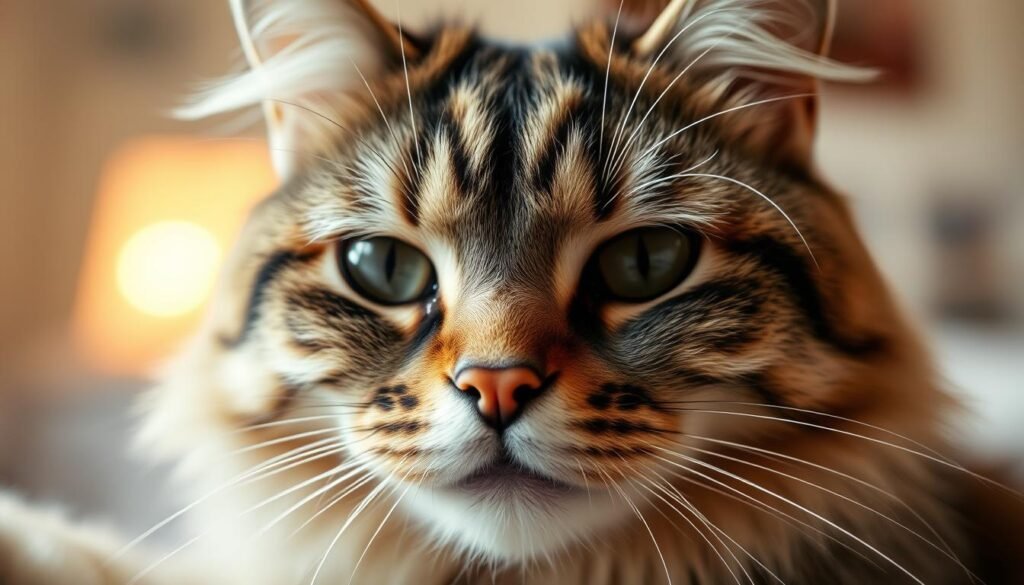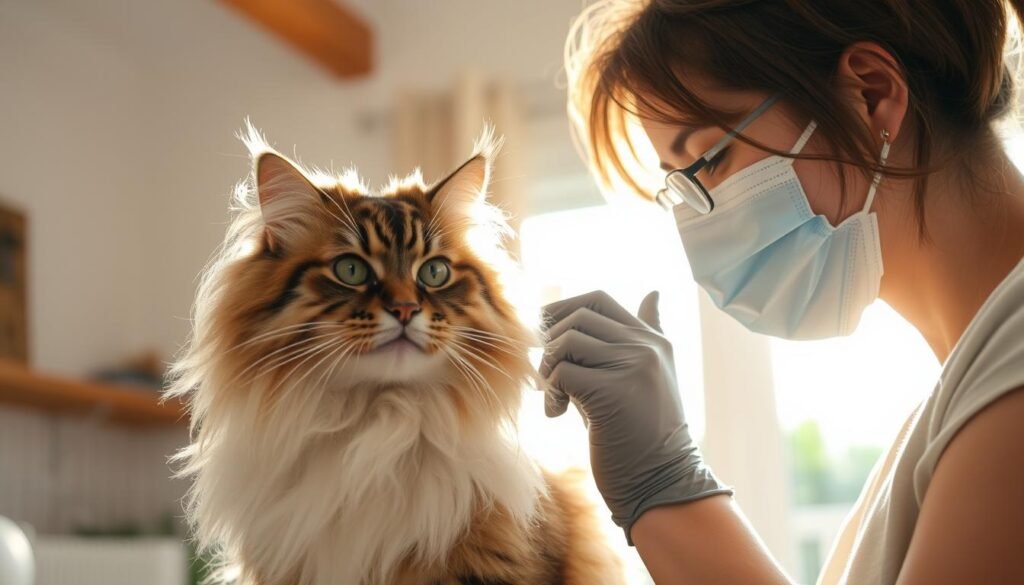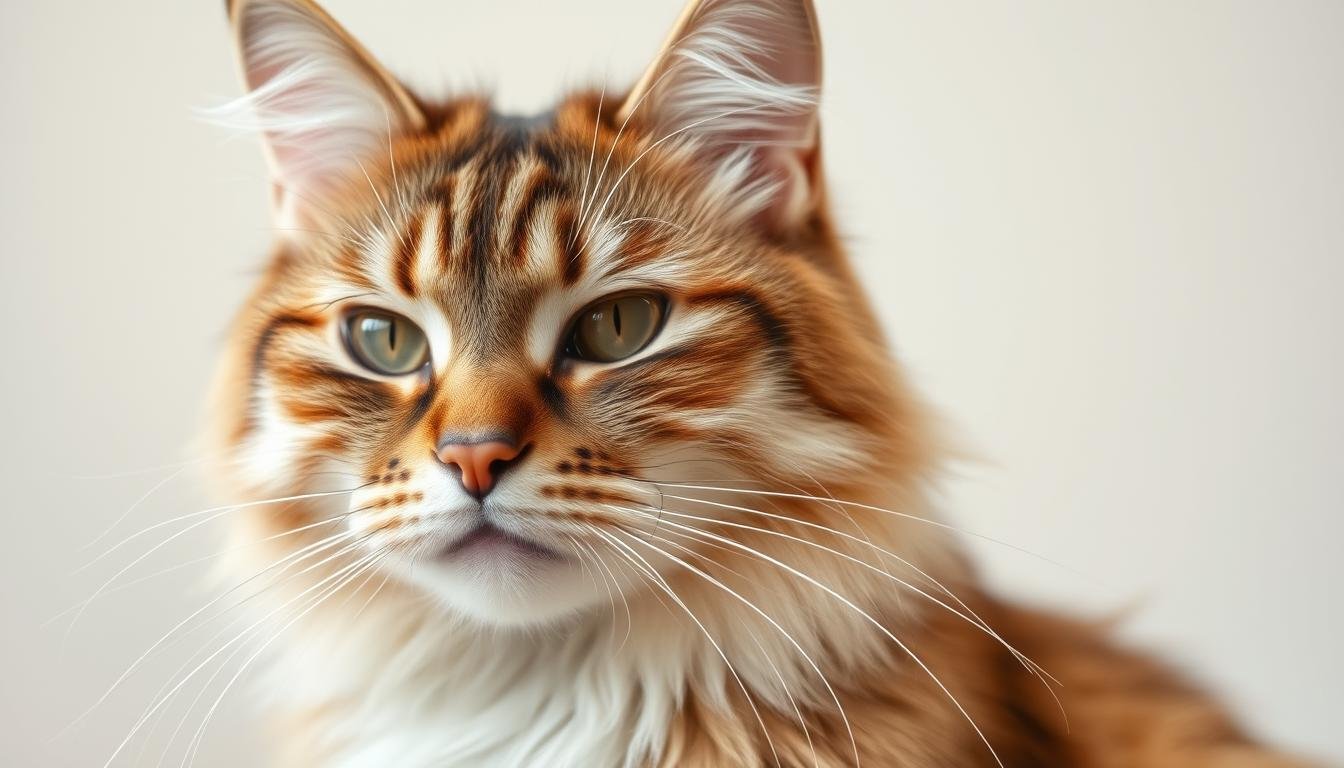Allergies to Maine Coon Cats: What You Need to Know
Table of Contents
If you’re thinking about getting a Maine Coon cat, you might love their grand look and warm personality. But, if you have cat allergies, you might wonder if they’re a good fit for you.
Many people face this choice. They want a pet but worry about allergies. Maine Coon cats have a protein in their saliva and skin that causes most cat allergies.
This article will help you understand cat allergies and Maine Coon cats specifically. It aims to help you decide if this breed is right for your home.
Understanding Cat Allergies: The Basics
Cat allergies are common and affect many people. Knowing what causes them and their symptoms is key to managing them. If you’re thinking about getting a Maine Coon cat, it’s important to understand cat allergies.
What Causes Cat Allergies?
Allergies to Maine Coon cats come from proteins in their saliva, skin cells (dander), and urine. These proteins can become airborne and cause allergic reactions when inhaled. The main allergen is Fel d 1, found in the cat’s salivary and sebaceous glands.
Common Symptoms of Cat Allergies
Symptoms of cat allergies vary but often include breathing problems like sneezing and coughing. Some people may also get skin reactions like itching or rashes. Knowing these symptoms can help you figure out if you’re allergic to your Maine Coon cat.
| Symptom | Description |
|---|---|
| Sneezing | Frequent sneezing due to inhaling allergens |
| Coughing | Coughing fits triggered by airborne allergens |
| Skin Reactions | Itching, rashes, or hives due to allergic reactions |
Misconceptions About Cat Allergies
Many think cat hair causes allergies, but it’s actually dander and proteins from saliva and urine. Another myth is that some cat breeds are more allergenic. But, it’s the proteins in all cats that trigger allergies.
Maine Coon Characteristics and Allergen Production
Maine Coons have thick fur and grooming habits that affect their allergenic potential. If you’re thinking of getting a Maine Coon, knowing how their traits might affect your allergies is key.
Maine Coon Fur and Dander Properties
Maine Coon cats have a thick, double coat that sheds a lot all year. This shedding spreads allergens, as dander (dead skin cells) clings to their fur. It can cause allergic reactions in some people. The fur itself isn’t the main allergen; it’s the dander on the hair.
Grooming Habits and Saliva Distribution
Grooming is a big part of a Maine Coon’s day. As they groom, they spread saliva on their fur. This saliva contains Fel d 1, a protein that causes allergies. So, the more they groom, the more they spread this allergen.
Seasonal Shedding Patterns
Maine Coons shed seasonally, like many double-coated breeds. In spring and fall, they shed a lot as they switch coats. This can make allergy symptoms worse, as more dander is released into the air.
Knowing these traits is important for deciding if a Maine Coon is hypoallergenic. While no cat is completely hypoallergenic, some are better for people with allergies. Maine Coons’ thick coats and heavy shedding might not be ideal for those with severe allergies.
Are Maine Coon Cats Hypoallergenic?
Many people with allergies wonder if Maine Coon cats are hypoallergenic. To understand this, we need to know what hypoallergenic means.
The Myth of Hypoallergenic Cats
Some think hypoallergenic cats have no allergens. But, no cat is completely hypoallergenic. Some breeds, though, have fewer allergens than others. The main allergen is Fel d 1, found in cat saliva, urine, and dander.
Comparing Maine Coons to Other Cat Breeds
Maine Coon cats are not usually seen as hypoallergenic. They have a thick coat that sheds a lot, especially in seasons. This can make allergies worse. Compared to others, Maine Coons have a lot of dander, which is bad for severe allergy sufferers.
But, some breeds like the Sphynx or Devon Rex are more hypoallergenic. They shed less or have special coats.
Individual Variation Among Maine Coons
Every cat, even in the same breed, can be different in how much they trigger allergies. Some Maine Coons might cause fewer problems for some people. Regular grooming and a clean home can also help lower allergens.
If you’re allergic and thinking about a Maine Coon, spend time with one first. This can help you see how you react. Also, using strategies for managing Maine Coon cat allergies can lessen symptoms.
Allergies to Maine Coon Cats: Facts and Research
Understanding Maine Coon cat allergies is key for those considering bringing one home. These allergies are caused by proteins in the cat’s dander, saliva, and urine.
Scientific Studies on Maine Coon Allergens
Studies have looked into Maine Coon cat allergens. They found proteins like Fel d1 and Fel d4 are main allergens. These proteins come from the cat’s salivary glands and skin, causing allergic reactions.
A study in a scientific journal found Maine Coon cats may produce more allergens. This is because of their size and grooming habits. It’s important to know about Maine Coon cats and their impact on allergies.

Fel d1 Protein Levels in Maine Coons
The Fel d1 protein is a major allergen in cats. Research shows Fel d1 levels vary among cats, including Maine Coons. The cat’s sex, age, and grooming habits can affect how much Fel d1 is produced.
A study compared Fel d1 levels in different cat breeds. It found Maine Coon cats may have higher levels due to their size and coat. But, individual variation is significant. This means some Maine Coon cats may produce fewer allergens, making them better for households with allergies.
Genetic Factors Affecting Allergen Production
Genetics play a big role in how much allergens cats produce, including Maine Coons. Research has found certain breeds and individuals produce less Fel d1. This suggests genetics may influence allergen production.
Breed-Specific Considerations
Maine Coon cats have unique traits that may affect their allergen production. Their thick coat needs regular grooming, which can spread allergens. Knowing these traits is important for managing allergies.
| Factor | Influence on Allergen Production | Relevance to Maine Coon Cats |
|---|---|---|
| Fel d1 Protein Level | Directly causes allergic reactions | Maine Coons may have higher levels due to size and coat |
| Grooming Habits | Distributes allergens into the environment | Maine Coons require regular grooming, potentially increasing allergen distribution |
| Genetic Factors | Influences the amount of allergens produced | Individual Maine Coon cats may vary in allergen production due to genetic differences |
Identifying Maine Coon Cat Allergy Symptoms
Allergies to Maine Coon cats can show up in different ways. It’s important to spot the signs early. If you’re around these cats and feel odd, finding out why is key.
Respiratory Symptoms
One common allergy symptom is breathing trouble. You might cough, wheeze, or feel short of breath. In bad cases, it can even cause asthma attacks.
Skin Reactions
Skin issues are another common problem. You might get rashes or hives from touching the cat’s dander or saliva.
Eye and Nasal Symptoms
Eye and nose problems are also common. You might sneeze, have a runny nose, or itchy eyes. These usually happen when you breathe in allergens.
When to Seek Medical Attention
If you have severe symptoms like trouble breathing or a fast heartbeat, get help right away. As an expert noted, “Early diagnosis and treatment can greatly improve life for allergy sufferers.” Managing your allergies well is crucial to enjoying life with your Maine Coon cat.
“Allergies can be a big problem for cat owners, but knowing the symptoms is the first step to managing them.”
Knowing these symptoms and acting fast can help you manage your allergies. This way, you can still enjoy your pet.
Testing and Diagnosing Cat Allergies
To find out if you’re allergic to Maine Coon cats, you need to do a few things. First, you can get tested by a professional. Then, you can also try some tests at home to see how bad the allergy is.
Professional Allergy Testing Methods
Getting tested by a doctor is a good way to know if you’re allergic to cats. There are two main ways doctors test for allergies:
- Skin Prick Test: This test puts a bit of cat allergen on your skin. It’s usually on your arm or back. Then, the skin is pricked to let the allergen in. The doctor watches how your skin reacts.
- Blood Test: A blood sample is taken. It’s sent to a lab to check for cat allergy antibodies.
Both tests work well, but which one you get depends on your situation. This includes any skin problems or medicines you’re taking.
At-Home Testing Options
If you want to test yourself at home, there are kits available. These kits usually include:
- Allergy Strips or Dipsticks: These test for IgE antibodies in your blood or saliva.
Home tests are easy to use but might not be as accurate as doctor’s tests. So, use them carefully.
Distinguishing Maine Coon Allergies from Other Allergies
It’s important to tell if your allergy is from Maine Coon cats or something else. Here’s how:
- Watch your symptoms: Do they only happen when you’re near your Maine Coon?
- Look for other allergy signs: Are you reacting to other things too?
- See a doctor: They can figure out what’s really causing your symptoms.
By getting tested by a doctor and doing some tests at home, you can find out if you’re allergic to Maine Coon cats. This helps you manage your allergy better.
Managing and Treating Maine Coon Cat Allergies
If you’re allergic to Maine Coon cats, there are ways to feel better. Making changes at home and getting medical help can help a lot. It’s important to manage your allergies well to have a good time with your pet.
Environmental Management Strategies
It’s key to make your home safe from Maine Coon allergens. There are a few ways to do this.
HEPA Filters and Air Purifiers
HEPA filters and air purifiers can cut down on cat dander and allergens in the air. They work best in places where your cat hangs out a lot.
Cleaning Protocols for Cat Owners
Cleaning often and well is important to keep allergens away. You should vacuum with a HEPA-filter vacuum, dust with a damp cloth, and wash your cat’s bedding often.
| Cleaning Task | Frequency | Benefit |
|---|---|---|
| Vacuuming with HEPA-filter vacuum | Daily | Reduces allergen accumulation on floors |
| Dusting with damp cloth | Weekly | Minimizes dust and allergens on surfaces |
| Washing cat bedding | Bi-weekly | Reduces allergen buildup in cat areas |
Medical Treatment Options
There are also medical ways to help with Maine Coon cat allergies.
Over-the-Counter Solutions
Antihistamines and decongestants from the store can help with sneezing, runny nose, and itchy eyes.
Prescription Medications and Immunotherapy
If your allergies are worse, your doctor might prescribe corticosteroids. Immunotherapy, or allergy shots, can also be a good long-term option for some.
By using these home changes and medical treatments, you can manage your Maine Coon cat allergies. This way, you can enjoy a healthier life with your pet.
Preventing Allergic Reactions to Maine Coon Cats
If you’re allergic to Maine Coon cats, there are ways to lessen your symptoms. You can’t get rid of all allergens, but you can cut down on them. This can help make your reactions less severe.
Special Grooming Techniques
Regular grooming is key to reducing hair and dander that can cause allergies. Brush your Maine Coon cat often to get rid of loose hair. Also, bathing them regularly can lower the allergens on their coat.
Allergen-Reducing Products
There are products that can lessen allergens from Maine Coon cats. These include sprays, wipes, and shampoos made to cut down dander and allergens. Choose products labeled as “allergen-reducing” to find the best ones for your needs.

Creating Allergen-Free Zones in Your Home
Setting up allergen-free zones in your home can help manage your allergies. Make your bedroom a cat-free zone to have a safe place when allergies flare up.
Diet Considerations for Reducing Allergens
Some studies show that certain diets can lower allergens in cats. Talk to your vet about changing your Maine Coon’s diet to see if it helps with allergens.
| Strategy | Description | Effectiveness |
|---|---|---|
| Regular Grooming | Brushing and bathing to reduce loose hair and dander | High |
| Allergen-Reducing Products | Sprays, wipes, and shampoos designed to reduce allergens | Medium to High |
| Allergen-Free Zones | Designating areas off-limits to cats | High |
| Dietary Adjustments | Special diets to reduce allergen production | Variable |
Conclusion
Managing Maine Coon cat allergies is a complex task. Understanding the causes and characteristics of Maine Coon cats is key. This knowledge helps you start to reduce your symptoms.
Strategies like regular grooming and using allergen-reducing products can help. Creating allergen-free zones in your home also reduces exposure. Professional advice and medical treatments are also important for managing symptoms.
With the right approach and professional help, you can have a great relationship with your Maine Coon cat. By managing your allergies well, you can live a happy and healthy life with your pet.

